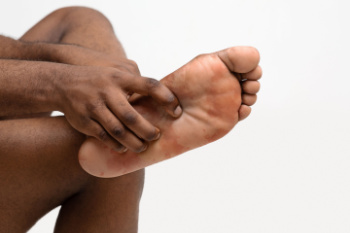Heel Pain May Indicate Plantar Fasciitis
Tuesday, 15 October 2024 00:00
Plantar fasciitis is a common condition that results in pain and inflammation in the heel and bottom of the foot. The primary symptom is a sharp, stabbing pain, particularly noticeable with the first steps in the morning or after prolonged periods of sitting. The discomfort often eases with movement but may return after long periods of standing or walking. This condition is typically caused by excessive strain on the plantar fascia, the thick band of tissue running along the bottom of the foot. Contributing factors include overuse, footwear that lacks ample cushioning, and having poor foot biomechanics, such as flat feet or high arches. Activities that involve repetitive stress, like running or standing for long periods, can also increase the risk. If you have heel pain, it is suggested that you visit a podiatrist who can offer an accurate diagnosis and treatment.
Plantar fasciitis is a common foot condition that is often caused by a strain injury. If you are experiencing heel pain or symptoms of plantar fasciitis, contact one of our doctors from Coral Desert Foot & Ankle. Our doctors can provide the care you need to keep you pain-free and on your feet.
What Is Plantar Fasciitis?
Plantar fasciitis is one of the most common causes of heel pain. The plantar fascia is a ligament that connects your heel to the front of your foot. When this ligament becomes inflamed, plantar fasciitis is the result. If you have plantar fasciitis you will have a stabbing pain that usually occurs with your first steps in the morning. As the day progresses and you walk around more, this pain will start to disappear, but it will return after long periods of standing or sitting.
What Causes Plantar Fasciitis?
- Excessive running
- Having high arches in your feet
- Other foot issues such as flat feet
- Pregnancy (due to the sudden weight gain)
- Being on your feet very often
There are some risk factors that may make you more likely to develop plantar fasciitis compared to others. The condition most commonly affects adults between the ages of 40 and 60. It also tends to affect people who are obese because the extra pounds result in extra stress being placed on the plantar fascia.
Prevention
- Take good care of your feet – Wear shoes that have good arch support and heel cushioning.
- Maintain a healthy weight
- If you are a runner, alternate running with other sports that won’t cause heel pain
There are a variety of treatment options available for plantar fasciitis along with the pain that accompanies it. Additionally, physical therapy is a very important component in the treatment process. It is important that you meet with your podiatrist to determine which treatment option is best for you.
If you have any questions, please feel free to contact one of our offices located in St. George and Kanab, UT, and Mesquite, NV . We offer the newest diagnostic and treatment technologies for all your foot care needs.




